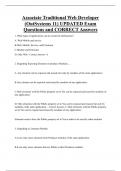Associate Traditional Web Developer
(OutSystems 11) UPDATED Exam
Questions and CORRECT Answers
1. What types of applications can be created in OutSystems?
A. Web Mobile and service
B.Web, Mobile, Service, and Extension
C.Module and Extension
D. Only Web - Correct Answer- A
2. Regarding Exposing Elements in producer Modules.....
A. Any element can be exposed, and reused, but only by modules of the same application.\
B.Any element can be exposed, and reused by modules of any application.
C.Only elements with the Public property set to Yes can be exposed and reused by modules of
any application.'
D. Only elements with the Public property set to Yes can be exposed and reused, but only by
modules of the same application. - Correct Answer- C.Only elements with the Public property
set to Yes can be exposed and reused by modules of any application.'
Elements need to have the Public property set to Yes in order to be used by other modules
3. Regarding a Consumer Module
A.It can only reuse elements from Producer modules of the same application.
B.It can only reuse elements that are Public in their Producer modules.
,C.It can reuse any element from any Producer module.
D.It can only reuse elements from Producer modules of other applications - Correct Answer-
B.It can only reuse elements that are Public in their Producer modules.
Only Public elements in their modules can be reused by other modules in the environment.
4. Does OutSystems manage the underlying database tables for the developer?
A.Yes
B.No - Correct Answer- A.Yes
Entites, attributes and indexes are automatically managed by the platform when modules are
published.
5. Entities and Attributes are created in the database as ...
A.Tables and Columns
B.Tables and Indexes
C.Indexes and Columns
D.Tables and Constraints - Correct Answer- A
6. If an attribute is named "TotalCount", OutSystems will automatically set its data type to ...
A. Text
B.Integer
C.Boolean
D.Date - Correct Answer- B.Integer
Data types are inferred automatically based on the name. *Count maps to Integer.
7. Entities are created with a set of Entity Actions for CRUD operations, which ones?
,A. Insert,Update,Delete
B. Create, CreateOrUpdate, Update, Get, GetForUpdate, Delete
C.GET, POST, DELETE
D.Add, Change, Remove - Correct Answer- B. Create, CreateOrUpdate, Update, Get,
GetForUpdate, Delete
Entities defined in OutSystems have these entity actions. In the case of a Static Entity only
the Get entity action is provided.
8. Input parameters are always mandatory
A.True
B.False - Correct Answer- B.False
Input parameters can be set as mandatory thru the Is Mandatory property.
9. Output parameters are available ...
A.Only inside their implementation scope.
B.Only outside their implementation scope.
C.Both inside and outside their implementation scope. - Correct Answer- C.Both inside and
outside their implementation scope.
A value must be assigned to the Output Parameter inside to be returned to the outside.
10. A Structure can have attributes of the following data types:
, A.Basic, Complex, and Record
B.Basic, String, and Object
C.Basic, Structure, Entity, and List
D.Basic and List only - Correct Answer- C.Basic, Structure, Entity, and List
These are the selected four. Don't forget that within Basic we have Text, Integer, Email,
Currency, ...
11. A list in OutSystems is ....
A. Collection with the same data type
B.A collection of elements with different data types - Correct Answer- A. Collection with the
same data type
Lists in OutSystems are homogeneous, meaning that all elements have the same data type
12. Does OutSystems manage the underlying database tables for the developer?
A.Yes
B.No - Correct Answer- A.Yes
Entites, attributes and indexes are automatically managed by the platform when modules are
published.




